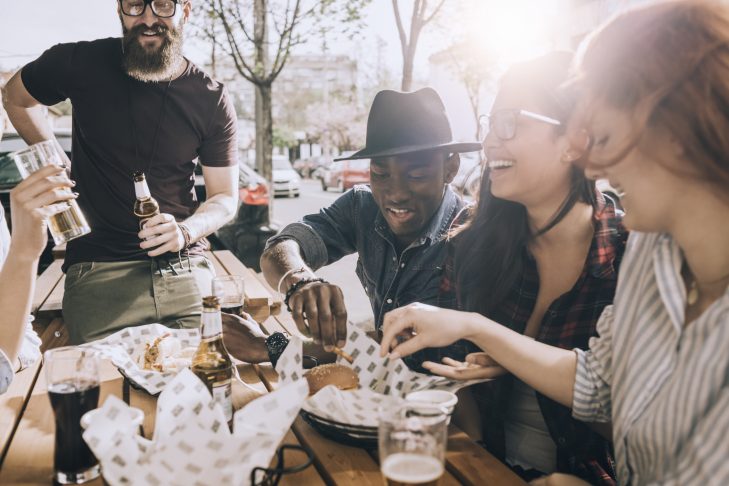Michael Twitty’s “The Cooking Gene” called to mind my first visit to Mississippi, some 30 years ago. I traveled there to speak at a weekend gathering of area Jews held at the Henry S. Jacobs camp in rural Utica. People from all over the state traveled to that camp for the weekend, some of them the only Jews in their town. What drew them, it soon became clear, had less to do with my lectures than with the lure of family and food.
Family, what they called mishpocheh, or, per Twitty’s definition, “family, clan, tribe, a fellow Jew, a member of the tribe,” characterized the bonds of peoplehood linking Mississippi’s Jews one to another. Many of those attending were literally cousins; others shared common memories from camp, college, or previous retreats. They came to see and catch up with one another, to reinforce that precious feeling of mishpocheh that tied them all together and distinguished them from the non-Jews among whom they ordinarily hid.
Evening services, morning services, my lectures—all were politely tolerated over the course of the weekend. What really excited everyone, though, was mealtime. Theirs was not the usual Shabbat fare that I knew from home. Instead, they set out exotic fish, corn bread, crispy-baked chicken, barbecued meats, black-eyed peas, unfamiliar sauces, and endless desserts. No pork products were served—that was taboo. But only a small number of attendees otherwise followed the strict laws of kashrut. Their food, instead, harkened back to a different set of traditions—those of the Old Jewish South.
“Eating in the South is regarded as seriously as religion, and for most southerners eating is a religion,” Marcie Cohen Ferris reports in her account of Southern Jewish foodways entitled “Matzoh Ball Gumbo” (2005). “Southern Jewish history reminds us of our nation’s racial and religious diversity, and nowhere is this diversity better understood and tasted than at the dinner table.”
-
The first Jew to eat dinner in the American South may have been a mining engineer named Joachim Gaunse. He formed part of the pioneering colony of Roanoke where, in 1585, he set up a laboratory and searched for gold. He left within a year, greatly disappointed.
The Jews I met in the dining room of Jacobs Camp descended, for the most part, from immigrants who arrived much later. Their ancestors were Central and Eastern European Jews who migrated to America between 1825 and 1924. The country’s Jewish population during those years mushroomed from 4,000 to 4 million. Some of those Jews sought their fortunes in the South.
Sprinkled among those attending the retreat were also a few Jews of color. For the most part, they or their ancestors had converted at some point, just as Michael Twitty did. Some Jews, prior to the Civil War, actively proselytized their slaves. A few raised their mixed-race children (the products of Jewish men and black slave women) as Jews. The great majority of Jews of color in the South, however, found Judaism after slavery, either as part of an effort to align themselves with God’s “Chosen People,” or in a bid to divorce themselves from the Christian faith of their oppressors.
Besides interacting with Jews of color, the White Southern Jews in the group spoke wistfully about individual black Christians whom they knew. One, utilizing genealogy and family records, had even reconnected with descendants of slaves who prior to the Civil War had belonged to her paternal ancestors. “We are now good friends,” she smilingly assured me. More commonly, Jews warmly recalled to me cooks and housekeepers from when they were young: black women who had been fixtures in their parental homes, and who nurtured and bathed them. Over time, these domestics taught their Jewish employers the secrets of Southern cooking even as they themselves came to appreciate the wonders of Jewish cooking.
Of course, as Ferris explains, “more than food passed back and forth between Jewish and African American families as black cooks and caterers baked sweet potato pies and cornbread dressing for Jewish employers and went home after holiday meals and bar mitzvahs with leftover chopped liver and kugel. Relationships were embedded in shared recipes and food that traveled between Jewish and African American homes.”
I left Jacobs Camp after just a weekend having gained a more profound understanding of black-Jewish relations in Mississippi, and a greater appreciation too for the differences between Jewish life there and in Boston. But later, reading Ferris’ book and now Twitty’s, I came to realize that the anticipation of mealtime over that weekend, as well as the dishes that were served, revealed far more than I had grasped back then.
“Food,” Twitty explains, “is an archive, a keeper of secrets.”
Never miss the best stories and events! Get JewishBoston This Week.











